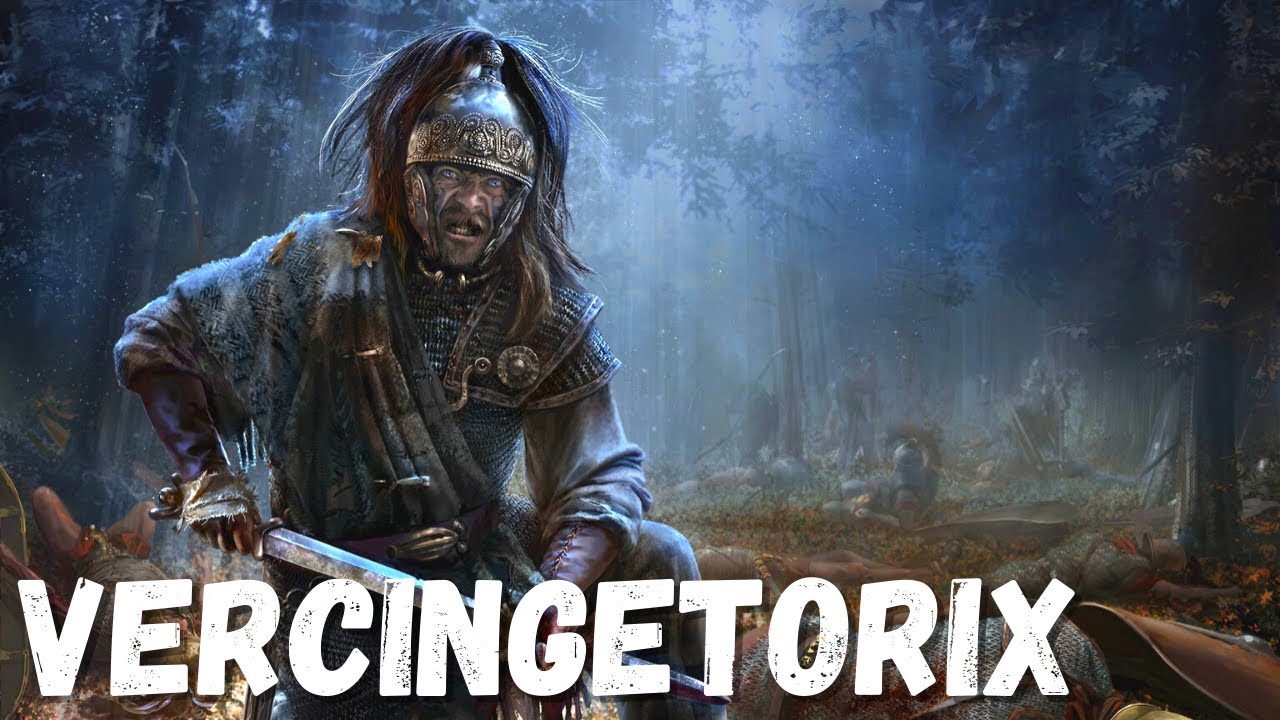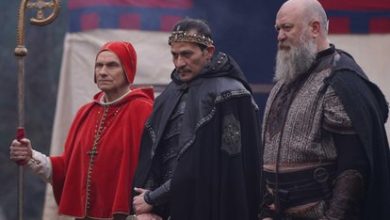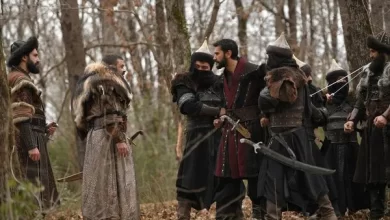Vercingetorix | Legendary King of Gaul & Bane of Caesar, Biography & Death
Vercingetorix Biography:
Vercingetorix was a chieftain and warrior who lived during the late Roman Republic, around 82-46 BC. He is most famously known for his role as a leader in the Gallic Wars against Julius Caesar.
Bane of Caesar:
Vercingetorix led the united Gallic tribes in a rebellion against Caesar’s expansionist campaigns in Gaul. He is considered one of Caesar’s most formidable adversaries during the Gallic Wars.
Death:
Vercingetorix’s revolt against Caesar ultimately ended in defeat for the Gauls. He was captured by the Romans in 52 BC, and after being paraded in a Roman triumph, he was imprisoned for several years. In 46 BC, he was executed by strangulation in a Roman prison
Vercingetorix, Legendary Gallic king who united ancient Gaul in a heroic attempt to resist the invasion of the mighty Roman Empire and it’s famed general Julius Caesar. He is considered to this day the first national hero of France for his valiant defence of his homeland. But what made him so special, and was he ultimately victorious in defeating the Romans? Let’s find out together, right now

The name Vercingetorix translates literally to “great warrior King”. Believed to have been more of a title bestowed upon him for the many successful battles during his life, Gauls famously kept their real birth names a secret known only to close family.
They believed there was power in a name, much like in many of the mythologies we cover on this channel. He is described as a tall and handsome man, a strong and charismatic leader who, much like his great rival Caesar, was renowned for his inspirational public speeches and rallying war cries. Despite what would become a name and story to last thousands of years, very little is known of the early life of Vercingetorix. He was the son of the Gallic chief Celtillus, leader of the powerful Averni tribe and is thought to have been a fierce and intelligent warrior even in his early years as he fought in the various tribal conflicts that plagued the country.
He was truly tested for the first time when several German tribes were forced by wars of their own to emigrate into Gaul, disturbing the delicate balance of the many tribes and inevitably leading to conflict. Caesar, who at the time was Governor of nearby Hispania, modern day Spain, saw this as an opportunity to gain influence in the region.
He defeated the strongest Germanic tribe, the Helvetii, and proceeded to wage war on the others that followed, actually enlisting the aid of several Gallic tribes as mercenaries to bolster his forces. Vercingetorix was amongst the Gauls that fought for Caesar and many believe this is where he gained valuable insight and experience into the workings and tactics of a Roman legion. Knowledge that he would make good use of later in life. With the German incursion into Gaul dealt with, Caesar, rather than retreating back to Hispania, began expanding his control in the region – his plan all along.
He introduced Roman law and culture, something the Gauls were not willing to accept. This led to one of the Gallic tribes rising in outright rebellion, the Eburones. As he was want to do, and in the typical style that made him one of the most successful generals in all of history, Caesar took command of his forces personally and, without hesitation or mercy, crushed the Eburones in one fierce battle. With the conflict won, Caesar proceeded to massacre
the survivors as a warning to other tribes against any future ideas of freedom. Many were sold into slavery and the tribal owned lands were burnt to the ground. By this time, Vercingetorix’s father had died, promoting him to Chieftain of the Averni tribe. He was outraged by the punishment of the Eburones and demanded war was declared on Rome in revenge.
The tribal council of elders were scared however, and not willing to take the risk. This was not good enough for Vercingetorix and in 52BC, he went against the wishes of the council and took matters into his own hands. He attacked the roman occupied settlement of Cenabum, massacring the forces stationed there. Capturing all the food supplies hoarded by the Romans inside the town, he handed them out amongst his people and armed them with Roman weapons. Messengers were sent throughout Gaul to spread the word of his victory with a rallying cry for more to join their cause and rise up against their Roman oppressors. Almost all of the tribes responded.
It was a huge moment, the story of Vercingetorix and his brave victory spread like wildfire. His forces grew exponentially and the fight for freedom had begun. Caesar was out of the country at this time and so had left his second in command, Labienus, in charge. Whilst clearly a competent general, Labienus was not the equal of Caesar and struggled to contain this new threat. The guerrilla tactics employed by Vercingetorix were new to him and many successful blows were dealt to Roman camps and supply lines.
Food was running short and with winter approaching, the Roman position was becoming more and more vulnerable. When news of the revolt and this new threat reached Caesar however, he was decisive in his response, mobilizing his army immediately and marching back to Gaul. He was so determined to react to this new enemy that he forced his troops to travel through blizzards and over mountains of thick snow. Word reached Vercingetorix that the dreaded Roman warlord was returning with a fresh army and so he transitioned to a scorched earth policy, burning everything in his path that could possibly help the Roman army on their travels.
It was hard to burn his own land, but he saw it as a necessary evil toward the greater good of winning their freedom. Whole cities were destroyed, villages, farms even private homes. Anything the Romans would be able to use. Gaul united around him and although it pained them, most understood the need. That is until he reached the city of Avaricum. There the inhabitants pleaded with Vercingetorix to spare their city, they described it as a beautiful place that was the pride of Gaul. Vercingetorix was not happy with the decision, explaining that it would simply be taken by Rome and burnt anyway once the supplies had been stolen, but was eventually convinced to spare the city.
He did declare however, that he would not be trapped in the city with them and rode 20 miles away to camp. Caesar arrived shortly after at the head of his mighty army to find the city heavily defended and fortified. He immediately lay siege to the town, surrounding it with trenches and towers, but the Gauls would not be broken easily and the fighting was long and fierce. As determined and tireless as the Gauls were however, Caesar was a match for any man in that regard and each time a siege engine was destroyed,
he ordered the building of a new one. Thus the battle raged on for many days and weeks with no side willing to give in and no end in sight. That is until one night when a heavy storm fell across the region and most of the defenders retreated inside, taking shelter and assuming that no army would be able to attack them in such conditions. They underestimated Caesar however, the General spotting the lack of men atop of the walls and sending a single siege engine forward where his men were free to climb over and open the gate.
A slaughter followed as the city was taken without resistance. No quarter was given and of the 40,000 people inside the walls, only 800 escaped to tell the tale. The legend of Avaricum and its tragic fall was like a rallying cry for Vercingetorix and his cause. All of Gaul rose up in defiance of Rome, outraged by the massacre. The army of Vercingetorix doubled in a matter of weeks. He continued to harass the Roman forces, burning bridges, cutting supply lines, leading strikes against camps.
At the siege of Gergovia, Vercingetorix was even able to turn the men enlisted by Caesar to guard his supply lines and convince them to attack the Roman instead. Caesar was defeated in a direct assault led on the town and was forced to retreat, moving on without capturing the settlement. Vercingetorix won many minor victories over the enemy force, his major advantage being his superior cavalry who were both stronger and faster than the Romans. Caesar was no fool however, and quickly identified this weakness.
To solve the problem, he turned to his former enemies, the Germans, who were renowned for their excellent cavalry. This move took Vercingetorix by surprise, who, confident in his horse advantage, failed to spot Caesars new cavalry force and in their next encounter, was quickly routed by the new Roman soldiers. With no time to retreat and hide in the countryside, Vercingetorix was forced to take refuge in the city of Alesia. Knowing Caesar was not far behind, he fortified the town as strongly as he could but it went entirely against his thus far hugely successful hit and run tactics.
Upon arriving and finding the well defended city, Caesar wasted no time in setting up his siege. Unlike the siege of Avaricum however, this time he also built defences around his own army to protect against attacks from any possible reinforcements, well aware by now of the uniting power of the King of Gaul even from his inside the walls of the city. Time passed with several minor skirmishes and food began to run out. Vercingetorix released all of his horses and as many of his men as he could spare to go and find help. Some were able to break through the Roman lines and escape into the countryside.
He then sent out all the citizens of Alesia, who had been taken by surprise at his arrival, largely old men, women and children. He trusted in the honour of Caesar to not attack unarmed civilians and let them pass freely. Whilst the Roman commander did not kill these innocent people directly, he did not command his force to allow them passage, as good as condemning them to death. They were caught in between the two armies, stuck in no mans land. Here they would die slowly and tragically of starvation and exposure to the elements. More time passed until finally hope arrived in the form of the cousin of Vercingetorix who had rallied a large force of cavalry and come to assist.
He attacked the rear of Caesars siege camp and at last, the true battle had begun. Seeing the opportunity, Vercingetorix sallied forth from the city with his own force to pincer the Romans in between the two Gallic armies. The Roman line began to crumble and victory seemed near for the Gaul’s. In a definitive moment in not only this battle, or even indeed the Gallic war as a whole, but perhaps for the entire legacy of Julius Caesar himself, the great Roman General, seeing the risk to his army, put on his famous red cloak and entered the fray. Instantly recognisable to his men,
He was a towering presence as he cut down Gallic fighters, inspiring the Romans who rallied hard, turning the tide of the battle until they were finally able to overcome the Gaul’s and win the day for Rome. It was a crushing defeat for Vercingetorix who had come so close to being the man to finally bring down the mighty Julius Caesar. Retreating back behind the walls of Alesia, all hope was now lost. Vercingetorix understood their position better than anyone. The reinforcements he had been waiting for had been defeated, his force was left in ruin and the siege would continue.
He had no choice left but to surrender. There are two different versions of what happens next. One account suggests the chiefs amongst his army captured Vercingetorix and handed him over to Caesar themselves in the hope of winning some personal reprieve. The more popular account however, and by far the more poetic, suggests that Vercingetorix, seeing the final flicker of hope die out, took it upon himself to march into Caesars camp alone and prostrate himself before the commander. Dressed in his finest armour, it was said that Vercingetorix, even in defeat, cast an imposing and impressive figure, taking many in the camp by surprise. He walked calmly and with purpose directly up to Caesar and without a word, slowly removed his armour, kneeling before the Roman.
Caesar however, was nothing if not consistent, and the ruthlessness that led to so much of his success took over. Rather than honour this bravery shown by a challenging and respected foe, he ordered the Gaul thrown in chains and taken back to Rome where he would be paraded in a cage as part of the triumph to celebrate the conquering of Gaul. The remaining defenders of Alesia were either massacred or sold into slavery. Vercingetorix died several years later, still a prisoner in Rome, quietly and without fanfare. A death not befitting the heroism and drama of his life.
His legend however remained, growing over the many years since. Revered now as the first true hero of France, he is remembered fondly for his brilliance on the battlefield and his charismatic leadership that was able to unite all the tribes of Gaul, coming so close to defeating Caesar and winning freedom for his homeland. A fascinating figure from history and a true reminder of the fine lines that shape the world we know today.
If Vercingetorix had been able to press his advantage and win the battle of Alesia, the story of Julius Caesar and the Roman Empire may have been very different to the one we know. Regardless, Vercingetorix and his heroism, his outright bravery and willingness to risk everything to defend the freedom of his homeland, secured his legacy and ensures that he will forever be remembered as the great warrior King of Gaul. Thanks for Reading










